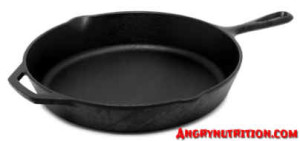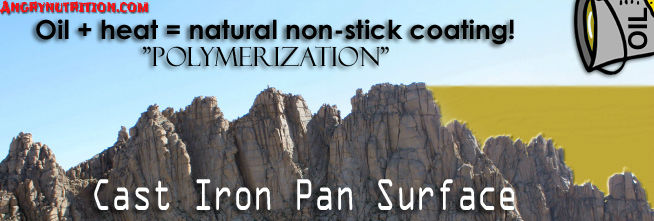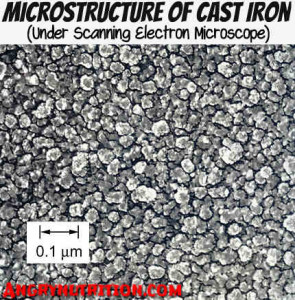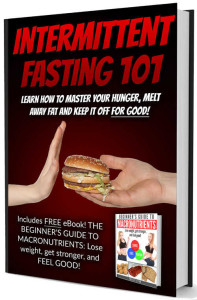 Cast iron cooking is a forgotten art. It’s been around since about 206 BC and it was very popular in the last few hundred years for cooking. (1) Since about the 1970’s, teflon and other forms of inferior cookware have come along and replaced it. This is sad because Cast iron cookware will last multiple lifetimes and is one of the best cooking tools around.
Cast iron cooking is a forgotten art. It’s been around since about 206 BC and it was very popular in the last few hundred years for cooking. (1) Since about the 1970’s, teflon and other forms of inferior cookware have come along and replaced it. This is sad because Cast iron cookware will last multiple lifetimes and is one of the best cooking tools around.
Teflon IS TOXIC!
Did you know that overheated teflon cookware can kill pet birds in seconds from the mere fumes it gives off? (2) While it won’t kill humans as quickly, it can “cause people to develop flu-like symptoms (called “Teflon Flu” or, as scientists describe it, “Polymer fume fever”)” (1) Do you really want this crap in your food? Is it worth the non-stick properties?? The good news is, you can get the same non-stick performance from a properly seasoned cast iron pan!
As a scientist specializing in material science and polymers, I can say I honestly do not trust teflon. Anything you apply a high heat to will have molecules energized and they’ll want to start bouncing around into objects nearby. In this case, you’ve got random toxic compounds bouncing around right into your food. No thanks. Here’s an infographic to show you more.
Surprised? I was too. Tell your friends and family!
Did you know #TEFLON fumes can #kill small animals?? #Castiron is king! more here: http://t.co/f8eCsNlN2b
— Yossif (@Angry_Nutrition) December 9, 2014
In the case of cast iron cookware, this is a good thing. It’s essentially an extra iron suppliment built into your food! I’d rather get extra iron and carbon in my diet rather than aluminum or poteintially damaging bits of teflon. Iron is essential and helps build more red blood cells. If anything, the standard American diet will actively leech out iron out of your diet, so getting more is benefical for everyone. Steels and glass are usually OK, not so sure about copper or ceramics. Either way, cast iron cookware has a ton of benefits, both for health and for cooking purposes.
How do I “season” cast iron cookware?
“Seasoning” just refers to the thin coating of fat that coats the bare metal of the pan. More specifically, “Polymerization” is taking the short chain oil molecules that make up the fats and using heat to slowly cause them to bind to the metal atoms. You go from a flowable slick oil to a very chemically stable hardened plastic (aka a polymer.) Without getting too sciency, this is similar to how teflon is made. However, instead of using unnatural lab chemicals, here we have oils that are naturally occuring (ie: bacon fat) This has worked for thousands of years to safely make a natural non-stick coating. Teflon is famous for being non-stick, but a well seasoned cast iron cookware pan will easily blow teflon out of the water.
Why does food stick to the pan?
It’s due to the microscopic landscape of the cooking surface and whatever is touching that surface. Think of it as a highly magnetic mountain range and you’re trying to get a metallic object close enough to heat it up but not have the peaks of the jagged mountain grab onto it. There’s two ways to get around this: cover the mountain with “plastic” to flatten it or make the mountain super slippery.

Teflon (a plastic) works as a non-stick surface due to the way the molecules interact with the foods. There’s very little reactivity on the teflon molecules, so even in high heat, they tend to not want to chemically bond with the food. It’ll still stick if you heat it too high and tiny scratches in the teflon will make it worthless (Cast iron is the opposite as you’ll see soon). For other non-coated forms of cookware, you have to add some kind of oil beforehand to prevent the bare material from grabbing onto the food.
How do make cast iron cookware non-stick?
The magic of cast iron cookware comes in how you season it (aka how you pour plastic onto the iron mountain). When you have a bare iron pan, it will quickly rust because the moisture in the air easily sticks to it and chemically corrodes it. Bare cast iron literally rusts in minutes. Covering it in a thin layer of oil or fat will prevent this. However, straight up oil won’t stick to the iron forever, it would be easily washed off with some soap. This is where high heat comes into play. The high heat will cause the oil molecules to become essentially a plastic (again, polymerization). This will make the coating more permanant and make a wonderful non-stick coating. Unlike teflon, you actually build the non-stick ability over time, and it’s IMPROVED by scratching the surface. Sounds crazy, but stay with me.
Teflon slowly degrades and scratches over time, whereas a properly seasoned cast iron pan will slowly get more layers of fat and as you use it, it will polymerize that fat and make for additional seasoning! You’re basically filling in the tiny scratches every time you use it. These cast iron pans last forever if you take care of them. Most of the teflon pans I’ve seen have pock marks and scratches, causing more teflon compounds to leak into the food. Once the teflon gets a couple big scratches, you might as well throw it away since everything is going to stick to it. You’re lucky to get a teflon pan to last 5-10 years at most. Cast iron cookware can last multiple lifetimes. The choice is clear here!
Using metal on teflon is idiotic! But on cast iron…
 Going back to the mountain analogy, think of it this way: The teflon coating on the mountain, once scratched off, will let the food touch the bare mountain again, ruining the non-stick coating. There’s no realistic way to repair the teflon once it’s scratched. No matter how careful you are, tiny scratches will appear over time and the teflon will leak into your food through the edges of those scratches. Cast iron, on the other hand, will let the oils (from the food itself) leak into the scratches, and it will actually REBUILD the plastic coating on the mountain. There’s a reason it was used for hundred of years.
Going back to the mountain analogy, think of it this way: The teflon coating on the mountain, once scratched off, will let the food touch the bare mountain again, ruining the non-stick coating. There’s no realistic way to repair the teflon once it’s scratched. No matter how careful you are, tiny scratches will appear over time and the teflon will leak into your food through the edges of those scratches. Cast iron, on the other hand, will let the oils (from the food itself) leak into the scratches, and it will actually REBUILD the plastic coating on the mountain. There’s a reason it was used for hundred of years.
I actually ENCOURAGE you to use metal on cast iron cookware. This is because you want to smooth out the plastic coating on the mountains. Imagine a giant knife flying by the top of the mountain, slicing off the roughest peaks of the plastic covering the mountains. Using a metal spatula, you’re flattening out the plastic coating of the mountains and making it hard for the food to be grabbed onto by the jagged metal mountains, as well as flattening the plastic coating. A ultra-flat surface will not be able to grab onto food. That’s why teflon works, there’s nothing for the food to “grab” onto that will make it stick. You can make a safer and healthier alternative using cast iron cookware!
REAL MEN PUMP IRON AND COOK IN IT!
There’s a good reason your grandma and grandpappy used cast iron back in the good old days. They were happier and healthier back then, and much of that starts in the kitchen. Sure, teflon is a little easier to use, but you’ll pay for it in other ways.
I’ll be going into more detail about why I love cast iron and how you should get started with it. You gotta know the best oils and methods to actually cause the polymerization and I’ll go into that later. It’ll last you a lifetime if you learn how to properly take care of it!
-Your friend,
Yossif

References: (1) https://en.wikipedia.org/wiki/Cast_iron (2) https://en.wikipedia.org/wiki/Polytetrafluoroethylene Pic credits: http://openclipart.org/detail/34309/architetto—-secchio-e-spugna-by-anonymous http://www.13ergirl.com/knifepointandten/knifepointandten.html https://en.wikipedia.org/wiki/File:Ta_C_structure.jpg https://commons.wikimedia.org/wiki/File:Cast-Iron-Pan.jpg



Well, it’s really a useful post. I like to have a cast iron cookware, but I know only when i make it nonstick can it last long, thank you, Yossif.
You’re welcome, glad you liked it! I’m a huge fan of cast iron so look for more future articles. I’ll also eventually release an ebook where I describe my complicated methods for a super-high quality coating in the near future, keep an eye out for it! Thanks!
-Yossif
I have a glass top stove and am afraid to use my cast iron skillets on it. I read somewhere you should not. Is this true?
Nope, they’ll work just fine on it. BUT, you should be careful not to move them around when they’re on the surface because it can really scratch it up if you’re not careful. Just be sure to lift it up rather than slide it and you’ll be fine. Thanks!
-Yossif